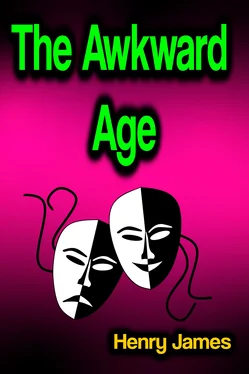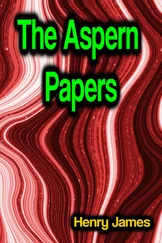1 ...6 7 8 10 11 12 ...21 "Ah but what becomes of friendship?" Mr. Longdon earnestly and pleadingly asked, while he still held Vanderbank's arm as if under the spell of the vivid explanation supplied him.
The young man met his eyes only the more sociably. "Friendship?"
"Friendship." Mr. Longdon maintained the full value of the word.
"Well," his companion risked, "I dare say it isn't in London by any means what it is at Beccles. I quite literally mean that," Vanderbank reassuringly added; "I never really have believed in the existence of friendship in big societies—in great towns and great crowds. It's a plant that takes time and space and air; and London society is a huge 'squash,' as we elegantly call it—an elbowing pushing perspiring chattering mob."
"Ah I don't say THAT of you!" the visitor murmured with a withdrawal of his hand and a visible scruple for the sweeping concession he had evoked.
"Do say it then—for God's sake; let some one say it, so that something or other, whatever it may be, may come of it! It's impossible to say too much—it's impossible to say enough. There isn't anything any one can say that I won't agree to."
"That shows you really don't care," the old man returned with acuteness.
"Oh we're past saving, if that's what you mean!" Vanderbank laughed.
"You don't care, you don't care!" his guest repeated, "and—if I may be frank with you—I shouldn't wonder if it were rather a pity."
"A pity I don't care?"
"You ought to, you ought to." And Mr. Longdon paused. "May I say all I think?"
"I assure you I shall! You're awfully interesting."
"So are you, if you come to that. It's just what I've had in my head. There's something I seem to make out in you—!" He abruptly dropped this, however, going on in another way. "I remember the rest of you, but why did I never see YOU?"
"I must have been at school—at college. Perhaps you did know my brothers, elder and younger."
"There was a boy with your mother at Malvern. I was near her there for three months in—what WAS the year?"
"Yes, I know," Vanderbank replied while his guest tried to fix the date. "It was my brother Miles. He was awfully clever, but had no health, poor chap, and we lost him at seventeen. She used to take houses at such places with him—it was supposed to be for his benefit."
Mr. Longdon listened with a visible recovery. "He used to talk to me—I remember he asked me questions I couldn't answer and made me dreadfully ashamed. But I lent him books—partly, upon my honour, to make him think that as I had them I did know something. He read everything and had a lot to say about it. I used to tell your mother he had a great future."
Vanderbank shook his head sadly and kindly. "So he had. And you remember Nancy, who was handsome and who was usually with them?" he went on.
Mr. Longdon looked so uncertain that he explained he meant his other sister; on which his companion said: "Oh her? Yes, she was charming—she evidently had a future too."
"Well, she's in the midst of her future now. She's married."
"And whom did she marry?"
"A fellow called Toovey. A man in the City."
"Oh!" said Mr. Longdon a little blankly. Then as if to retrieve his blankness: "But why do you call her Nancy? Wasn't her name Blanche?"
"Exactly—Blanche Bertha Vanderbank."
Mr. Longdon looked half-mystified and half-distressed. "And now she's Nancy Toovey?"
Vanderbank broke into laughter at his dismay. "That's what every one calls her."
"But why?"
"Nobody knows. You see you were right about her future."
Mr. Longdon gave another of his soft smothered sighs; he had turned back again to the first photograph, which he looked at for a longer time. "Well, it wasn't HER way."
"My mother's? No indeed. Oh my mother's way—!" Vanderbank waited, then added gravely: "She was taken in time."
Mr. Longdon turned half-round as to reply to this, but instead of replying proceeded afresh to an examination of the expressive oval in the red plush frame. He took up little Aggie, who appeared to interest him, and abruptly observed: "Nanda isn't so pretty."
"No, not nearly. There's a great question whether Nanda's pretty at all."
Mr. Longdon continued to inspect her more favoured friend; which led him after a moment to bring out: "She ought to be, you know. Her grandmother was."
"Oh and her mother," Vanderbank threw in. "Don't you think Mrs. Brookenham lovely?"
Mr. Longdon kept him waiting a little. "Not so lovely as Lady Julia. Lady Julia had—!" He faltered; then, as if there were too much to say, disposed of the question. "Lady Julia had everything."
Vanderbank gathered hence an impression that determined him more and more to diplomacy. "But isn't that just what Mrs. Brookenham has?"
This time the old man was prompt. "Yes, she's very brilliant, but it's a totally different thing." He laid little Aggie down and moved away as without a purpose; but his friend presently perceived his purpose to be another glance at the other young lady. As if all accidentally and absently he bent again over the portrait of Nanda. "Lady Julia was exquisite and this child's exactly like her."
Vanderbank, more and more conscious of something working in him, was more and more interested. "If Nanda's so like her, WAS she so exquisite?"
"Oh yes; every one was agreed about that." Mr. Longdon kept his eyes on the face, trying a little, Vanderbank even thought, to conceal his own. "She was one of the greatest beauties of her day."
"Then IS Nanda so like her?" Vanderbank persisted, amused at his friend's transparency.
"Extraordinarily. Her mother told me all about her."
"Told you she's as beautiful as her grandmother?"
Mr. Longdon turned it over. "Well, that she has just Lady Julia's expression. She absolutely HAS it—I see it here." He was delightfully positive. "She's much more like the dead than like the living."
Vanderbank saw in this too many deep things not to follow them up. One of these was, to begin with, that his guest had not more than half- succumbed to Mrs. Brookenham's attraction, if indeed he had by a fine originality not resisted it altogether. That in itself, for an observer deeply versed in this lady, was attaching and beguiling. Another indication was that he found himself, in spite of such a break in the chain, distinctly predisposed to Nanda. "If she reproduces then so vividly Lady Julia," the young man threw out, "why does she strike you as so much less pretty than her foreign friend there, who is after all by no means a prodigy?"
The subject of this address, with one of the photographs in his hand, glanced, while he reflected, at the other. Then with a subtlety that matched itself for the moment with Vanderbank's: "You just told me yourself that the little foreign person—"
"Is ever so much the lovelier of the two? So I did. But you've promptly recognised it. It's the first time," Vanderbank went on, to let him down more gently, "that I've heard Mrs. Brookenham admit the girl's good looks."
"Her own girl's? 'Admit' them?"
"I mean grant them to be even as good as they are. I myself, I must tell you, extremely like Nanda's appearance. I think Lady Julia's granddaughter has in her face, in spite of everything—!"
"What do you mean by everything?" Mr. Longdon broke in with such an approach to resentment that his host's gaiety overflowed.
"You'll see—when you do see. She has no features. No, not one," Vanderbank inexorably pursued; "unless indeed you put it that she has two or three too many. What I was going to say was that she has in her expression all that's charming in her nature. But beauty, in London"— and feeling that he held his visitor's attention he gave himself the pleasure of freely presenting his idea—"staring glaring obvious knock-down beauty, as plain as a poster on a wall, an advertisement of soap or whiskey, something that speaks to the crowd and crosses the footlights, fetches such a price in the market that the absence of it, for a woman with a girl to marry, inspires endless terrors and constitutes for the wretched pair (to speak of mother and daughter alone) a sort of social bankruptcy. London doesn't love the latent or the lurking, has neither time nor taste nor sense for anything less discernible than the red flag in front of the steam-roller. It wants cash over the counter and letters ten feet high. Therefore you see it's all as yet rather a dark question for poor Nanda—a question that in a way quite occupies the foreground of her mother's earnest little life. How WILL she look, what will be thought of her and what will she be able to do for herself? She's at the age when the whole thing—speaking of her 'attractions,' her possible share of good looks—is still to a degree in a fog. But everything depends on it."
Читать дальше












